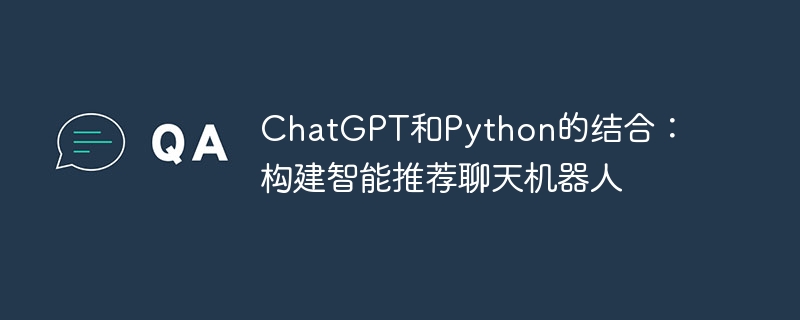Home >Backend Development >Python Tutorial >The combination of ChatGPT and Python: building intelligent recommendation chatbots
The combination of ChatGPT and Python: building intelligent recommendation chatbots
- 王林Original
- 2023-10-26 08:52:551036browse

The combination of ChatGPT and Python: building an intelligent recommendation chatbot
Abstract:
The rapid development of natural language processing technology and artificial intelligence has made chatbots a reality . This article will introduce how to build an intelligent recommendation chatbot using OpenAI's ChatGPT model and the Python programming language. We'll explore the advantages of using chatbots to provide comprehensive information and services, and provide some practical code examples to help readers build their own chatbots.
1. Introduction
A chatbot is a virtual assistant that can simulate and answer human conversations. They can be used in a variety of scenarios, including providing information, solving problems, providing advice, and entertaining. As natural language processing technology advances, chatbots are becoming increasingly intelligent, capable of conducting more complex and natural conversations with users.
2. Introduction to ChatGPT
ChatGPT is a natural language generation model developed by OpenAI. It is trained on large amounts of text data and can generate coherent natural language responses. Compared with traditional chatbots, ChatGPT has better context understanding and context awareness, making conversations smoother and more natural.
3. Use Python to implement a chatbot
To build an intelligent recommendation chatbot, we can use the Python programming language combined with the ChatGPT model. Below is a simple code example that shows how to use ChatGPT to generate responses:
import openai openai.api_key = 'YOUR_API_KEY' response = openai.Completion.create( engine="text-davinci-001", prompt="你好,我是你的虚拟助手。请问有什么可以帮助你的?", max_tokens=100, temperature=0.7, n=1, stop=None, temperature=0.7 ) reply = response.choices[0].text.strip() print(reply)
In this example, we used OpenAI’s Python library to call the ChatGPT model. First, we set up OpenAI’s API key. Then, we create a completion request using the openai.Completion.create function, where the engine parameter specifies the ChatGPT model to be used, and the prompt parameter sets the dialog's Initially, the max_tokens parameter limits the length of generated replies.
4. Intelligent recommendation function
In addition to generating text replies, we can also use the Python programming language to add intelligent recommendation functions to the chatbot. For example, when a user asks a question, the chatbot can recommend relevant content based on the user's interests and needs.
The following is a simple code example that shows how to recommend related articles based on the user's interests:
import requests
def recommend_articles(user_interest):
response = requests.get(f"https://api.example.com/articles?interest={user_interest}")
articles = response.json()
if len(articles) > 0:
return articles[0]
else:
return "抱歉,没有找到相关文章。"
user_interest = input("请输入你的兴趣:")
recommendation = recommend_articles(user_interest)
print(recommendation)In this example, we define a recommend_articles function, It accepts the user's interests as input and uses an API to get a list of related articles. If a related article is found, the function returns the first article in the list, otherwise it returns a message that no related article was found.
5. Conclusion
By combining the ChatGPT model and the Python programming language, we can build an intelligent recommendation chatbot that can provide comprehensive information and services. This article introduces the basic principles of ChatGPT and provides code examples for generating replies and intelligent recommendations to help readers build their own chatbots. Chatbots have huge application potential and can play an important role in various fields and scenarios.
The above is the detailed content of The combination of ChatGPT and Python: building intelligent recommendation chatbots. For more information, please follow other related articles on the PHP Chinese website!
Related articles
See more- What does str mean in python
- How to keep 2 decimal places in python
- What is the usage of range function in python
- Methods and practical experience on how to use Vue.js and Python to implement intelligent recommendation systems and personalized services
- How to design a system that supports knowledge maps and intelligent recommendations in online question answering

